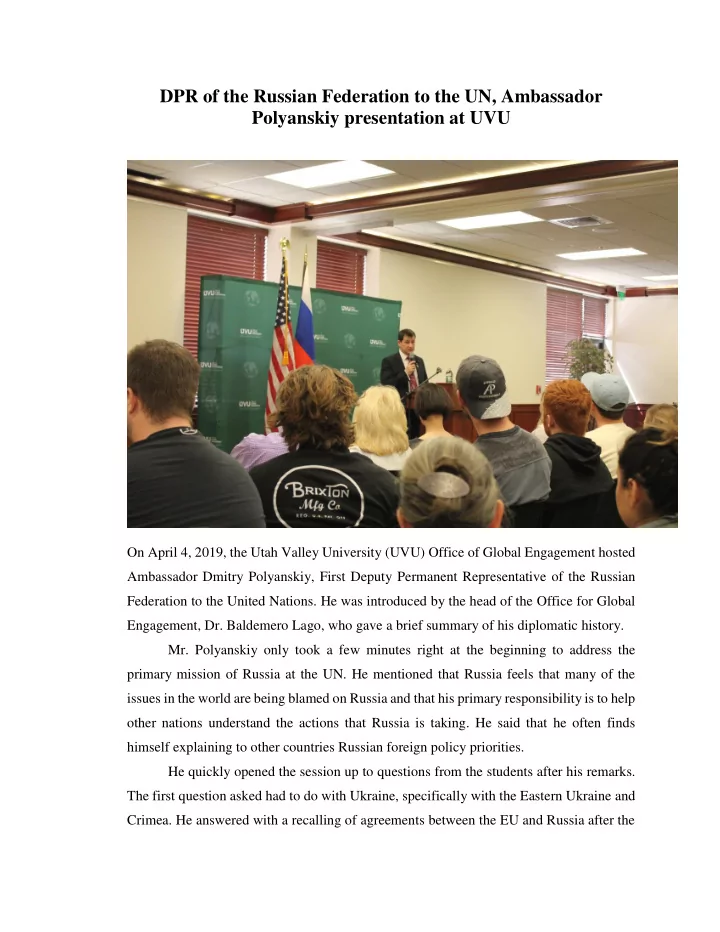

DPR of the Russian Federation to the UN, Ambassador Polyanskiy presentation at UVU On April 4, 2019, the Utah Valley University (UVU) Office of Global Engagement hosted Ambassador Dmitry Polyanskiy, First Deputy Permanent Representative of the Russian Federation to the United Nations. He was introduced by the head of the Office for Global Engagement, Dr. Baldemero Lago, who gave a brief summary of his diplomatic history. Mr. Polyanskiy only took a few minutes right at the beginning to address the primary mission of Russia at the UN. He mentioned that Russia feels that many of the issues in the world are being blamed on Russia and that his primary responsibility is to help other nations understand the actions that Russia is taking. He said that he often finds himself explaining to other countries Russian foreign policy priorities. He quickly opened the session up to questions from the students after his remarks. The first question asked had to do with Ukraine, specifically with the Eastern Ukraine and Crimea. He answered with a recalling of agreements between the EU and Russia after the
collapse of the Soviet Union, and agreements that the Ukraine would remain neutral. He mentioned that these promises were broken and that when they warned of the consequences, that was when unrest began in Kiev that led to a change in leadership. Fearing for the ethnic Russians in Crimea, the Russian government annexed the region after it held a referendum to join the Russian Federation. This narrative is definitely at odds with the one, portrayed in western reports and media that have stated that the referendum was fixed, and that Russian troops had entered Crimea even before the vote, known as “little green men.” Mr. Polyanskiy staunchly denied that any Russian troops or military hardware ever entered the Ukraine, stating that the men were civilian volunteers, and the hardware being captured from Ukrainian units. The next salvo of questions from a student in the audience were focused on the current unrest and Russian interest in Venezuela. Mr. Polyanskiy stated that Russia found the United States’ support of Guaido as the legitimate president of Venezuela as a breach of international norms. He went on to say that Maduro was the democratically elected president of Venezuela and that they do not recognize Guaido in having any power, saying he was “just some guy off the street,” that fit the United States’ vision for the country. He also was critical of US foreign aid that has been moving into the country without Maduro ’s express permission. He said that one cannot force feed someone who does not want to eat. He also answered a question about “technical specialists” that have been sen t from Russia to Venezuela to try and help the government reestablish essential services throughout the country. The US sees this however as a direct threat and a possibility that Russia may try to intervene militarily in Venezuela. Mr. Polyanskiy countered this idea by saying the small group would be unable to make any real military difference. He also repeatedly made remarks to not believe everything that you hear from the media, and that the students should strive to get their news from as many sources as possible to build a better picture of what is really going on. Finally, Ambassador Polyanskiy answered a final question addressing the United Nations Sustainable Development Goals, stating that Russia feels that they are equally important. The last decade has seen a definite uptick in the amount of tension between the United States and Russia, and it was an amazing opportunity to discuss some of those issues
with Ambassador Polyanskiy, who was most gracious on discussing some of the topics we did not see eye to eye on. Brandon Pedler, President, German club at UVU
Recommend
More recommend